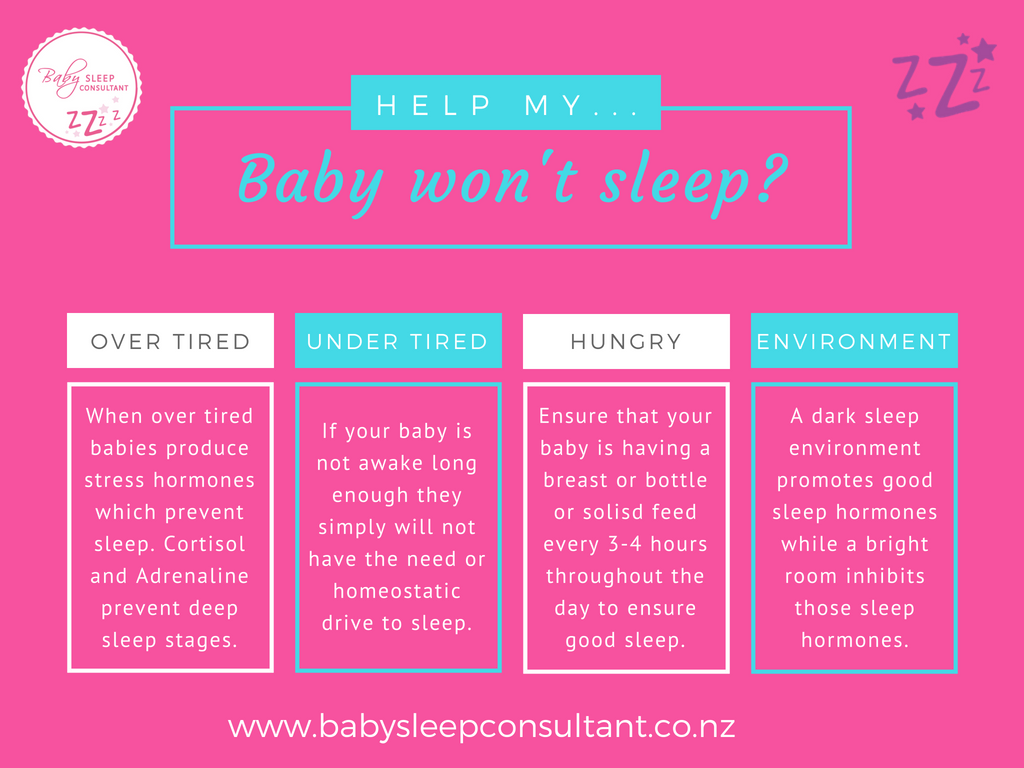You’ve just brought your newborn home, and amidst the joy and excitement, there’s one challenge that seems impossible to conquer: getting your little one to sleep. You might feel overwhelmed and exhausted, wondering what you’re doing wrong or if there’s a secret trick everyone else knows.
Rest assured, you’re not alone. Many parents face the same hurdle, and there’s hope for a more peaceful night ahead. You’ll discover practical tips and soothing techniques that can make a world of difference. Imagine a night where your baby sleeps soundly, and you finally get the rest you desperately need.
Sounds appealing, right? Let’s dive in and uncover the steps to help your newborn sleep better, transforming those sleepless nights into serene evenings.
Common Reasons For Newborn Sleep Challenges
Newborn sleep challenges can be tough for new parents. Understanding common reasons behind these struggles helps address them effectively. Here are some key factors that may affect your newborn’s sleep patterns.
Physical Discomfort
Newborns often experience physical discomfort. This can stem from a wet diaper or tight clothing. A small adjustment can sometimes help them settle more easily. Keep an eye on their physical surroundings for clues.
Hunger
Babies need frequent feeding, especially in early months. Hunger is a common reason for sleep interruptions. Ensure your baby is well-fed before bedtime. This helps them sleep longer and more peacefully.
Overstimulation
Too much activity can overwhelm a newborn. Bright lights and loud noises can hinder their ability to fall asleep. Create a calm, quiet environment to soothe them. This encourages better sleep habits.
Day-night Confusion
Newborns don’t yet know day from night. They might sleep more during the day and stay awake at night. Teach them the difference by keeping daytime bright and nighttime dim. This helps establish a routine.
Temperature
Babies are sensitive to temperature changes. Ensure their room is comfortable—not too hot or too cold. A consistent, cozy temperature aids restful sleep.
Developmental Changes
Growth spurts and milestones affect sleep patterns. These changes may cause restlessness or increased hunger. Be patient and adjust routines as needed. Understanding these phases helps manage sleep disruptions.
Creating A Sleep-friendly Environment
Creating a sleep-friendly environment can help when a newborn won’t sleep. Soft lighting and gentle sounds soothe the baby. A comfortable and safe crib ensures restful sleep.
Creating a Sleep-Friendly Environment Bringing home a newborn is a joyful yet challenging journey, especially when it comes to sleep. A baby’s sleep environment plays a crucial role in their ability to rest well. Transforming their room into a sleep-friendly haven can make a world of difference for both you and your little one.
Optimal Room Temperature
Babies are sensitive to temperature changes. Keeping the nursery at a comfortable temperature can help your newborn sleep better. Aim for a room temperature between 68-72°F (20-22°C). If you find it tricky to maintain this, consider using a room thermometer. Some parents find that dressing their baby in layers allows them to easily adjust to temperature changes. Have you noticed how your baby seems to relax more when they’re neither too hot nor too cold?
Soothing Lighting
Lighting can have a surprising impact on how well your baby sleeps. Soft, dim lighting can signal to your baby that it’s time to wind down. A nightlight might provide just enough illumination for late-night feedings without overstimulating your newborn. Think about how you feel in a dimly lit room after a long day. Your baby feels similarly soothed by gentle lighting. Experiment with a few different lamps or bulbs to find the perfect balance.
Noise Control
Newborns aren’t used to complete silence. In the womb, they’re surrounded by constant, comforting noise. Replicate this with a white noise machine or a fan to help mask sudden sounds that might wake your baby. Have you ever noticed how some background noise helps you concentrate? Your baby can benefit from a similar effect. Keep the volume low, just enough to create a consistent sound environment. Creating a sleep-friendly environment is about understanding and meeting your baby’s needs. By focusing on temperature, lighting, and noise, you can create a sanctuary that encourages restful sleep. What small changes can you make today to improve your newborn’s sleep space?
Establishing A Bedtime Routine
Establishing a bedtime routine can help your newborn sleep better. It signals that it’s time to wind down. A consistent routine offers comfort and security. It sets the stage for healthy sleep habits. Let’s explore some effective strategies.
Consistent Timing
Pick a bedtime and stick to it. Consistency is key. A regular schedule helps regulate your baby’s internal clock. Aim for the same time each night. This predictability helps your newborn relax. It prepares them for sleep.
Calming Activities
Choose soothing activities before bed. Reading a gentle story works well. Singing a lullaby can calm your newborn. These activities signal that bedtime is near. They create a peaceful environment. Ensure the lights are dim and the room is quiet.
Bath And Massage Ritual
A warm bath can be very soothing. It relaxes your baby’s muscles. Follow the bath with a gentle massage. Use a soft touch and baby-safe oil. This ritual can be a bonding moment. It helps your newborn feel secure and loved.
Feeding And Sleep Connection
Newborns often struggle to sleep due to hunger, leading to frequent wake-ups. Feeding schedules play a crucial role in establishing better sleep patterns. Ensuring your baby is well-fed can help improve sleep quality and duration.
Getting your newborn to sleep can feel like a puzzle with missing pieces. One key piece often overlooked is the connection between feeding and sleep. Understanding how these two are linked can make those sleepless nights a little more manageable. Let’s dive into some practical insights to help both you and your baby rest easier.
Hunger Cues
Recognizing your baby’s hunger cues can make a significant difference in their sleep patterns. Watch for signs like lip-smacking, sucking on hands, or a rooting reflex. Catching these early signals helps you feed your baby before they become too upset to settle down easily. Feeding promptly when your baby shows hunger cues can prevent over-tiredness. An overtired baby struggles to fall asleep and stay asleep. By tuning into these cues, you create a smoother transition from feeding to sleeping.
Night Feeding Tips
Night feedings can be daunting, but they are crucial for your baby’s growth. Keep the environment calm and quiet during nighttime feeds to avoid overstimulation. Dim the lights and minimize noise to help your baby understand that night is for sleeping. Consider having everything you need for feeding within arm’s reach to make the process smoother. A small nightstand with essentials can save you time and energy. This setup allows you to focus more on your baby and less on fumbling in the dark.
Breastfeeding And Sleep
Breastfeeding has a unique connection with sleep due to the presence of sleep-inducing hormones. Prolactin, found in breast milk, can help your baby relax and drift off to sleep. Nursing before bedtime can be a comforting ritual that signals it’s time to wind down. Some mothers find that breastfeeding helps them rest better too, thanks to the release of oxytocin, which promotes relaxation. If you’re breastfeeding, try to create a peaceful space for these moments. This can enhance the bonding experience and help both you and your baby settle down for the night. Have you noticed how feeding affects your baby’s sleep? Share your experiences or tips in the comments below. Your insights might just be the missing piece for another parent.
Swaddling Techniques
Welcoming a newborn is a joyous occasion, but sleepless nights can become overwhelming. You might find yourself wondering how to help your little one sleep better. Swaddling techniques can be a lifesaver for many parents, offering comfort and security to your newborn. Let’s dive into the benefits, safe steps, and when to stop swaddling your baby.
Benefits Of Swaddling
Swaddling mimics the cozy environment of the womb. It helps reduce your baby’s startle reflex, which often disrupts sleep. Swaddling can also provide warmth and security, making your baby feel safer and more relaxed.
Many parents notice improved sleep patterns with swaddling. Your baby might sleep longer stretches, giving you much-needed rest. Have you tried swaddling and seen a difference in your baby’s sleep?
Safe Swaddling Steps
Ensuring your baby is swaddled safely is crucial. Use a lightweight blanket and keep it snug but not too tight. Make sure your baby’s hips can move freely to promote healthy development.
Leave room around the chest for easy breathing. Always place your baby on their back to sleep. Are you confident in your swaddling skills, or do you need more practice?
When To Stop Swaddling
Knowing when to stop swaddling is important for your baby’s safety. Most babies begin to roll over around two to three months. Once your baby shows signs of rolling, it’s time to transition out of swaddling.
You can try sleep sacks or wearable blankets as alternatives. Observe your baby’s cues; they might prefer more freedom as they grow. How will you know if your baby is ready for the next sleep stage?

Credit: babysleepconsultant.co
Identifying Sleep Regression
Sleep regression in newborns often puzzles many parents. It’s a phase where a baby’s sleep pattern changes unexpectedly. Understanding this can help parents manage the challenges better. Babies may suddenly wake up more often or struggle to sleep. Recognizing these shifts is essential in addressing newborn sleep issues effectively.
Signs To Watch
Frequent night waking is a key indicator. Babies may wake up several times, disrupting their usual sleep pattern. Crying more often at night might also signal sleep regression. Difficulty settling down for naps or bedtime can be a sign. Increased fussiness or irritability is common during these periods. Parents should observe these behaviors closely to identify sleep regression.
Coping Strategies
Establishing a consistent bedtime routine can help. A calm environment aids in soothing a restless newborn. Gentle rocking or soft lullabies might ease their sleep struggles. Ensure the baby is comfortable and well-fed before sleep. Patience is crucial; these phases are temporary. Support from family can be beneficial during challenging nights.
Duration And Frequency
Sleep regressions typically last a few weeks. Most regressions occur around 4, 6, and 8 months. Each phase can vary in duration for different babies. Some may experience it for a shorter period. Others might face longer disruptions. Understanding these patterns can prepare parents for future sleep changes.
Soothing Techniques For Fussy Babies
Newborns often struggle with sleep. Gentle rocking and soft lullabies can help soothe a fussy baby. A warm bath or a quiet, dim room may also encourage relaxation and rest.
Bringing home a newborn can feel like stepping into an entirely new world, especially when your little one just won’t sleep. The nights can seem endless when your baby is fussy and restless. But before you start questioning your parenting skills, know that you’re not alone. Many parents face the same challenges, and there are tried-and-true techniques that can help soothe your baby to sleep. Let’s explore some of these soothing techniques to help your fussy baby—and you—get some much-needed rest.
White Noise
White noise can be a game-changer for babies struggling to sleep. The consistent hum mimics the comforting sounds of the womb, helping to calm your little one. Consider using a white noise machine or even an app on your phone. Some parents have found success with household items like a fan or a vacuum cleaner. Have you tried different types of white noise to see which one works best for your baby?
Gentle Rocking
Gentle rocking is a time-honored technique for soothing babies. The motion reminds them of being in the womb, swaying with every step you took. Try rocking your baby in your arms or using a rocking chair. You might also consider a baby swing for a hands-free option. Remember, your comfort matters too—find a position that’s easy on your back and arms.
Pacifier Use
Pacifiers can be an effective way to help your baby self-soothe. Sucking is a natural reflex for newborns and can provide instant comfort. Ensure you choose a pacifier that’s appropriate for your baby’s age and size. Some parents worry about pacifier use, but many experts agree that they can be beneficial for babies under six months. Have you found a pacifier that your baby seems to prefer? Sometimes, it takes trying a few different ones to find the perfect fit. Finding the right soothing technique can make a world of difference. It might require some trial and error, but stay patient. Your baby will soon find comfort, and you’ll both get the rest you need. What soothing techniques have you found most effective for your little one?

Credit: www.tapovanvidhyalay.in
When To Seek Professional Help
As a parent, it’s natural to feel anxious when your newborn struggles with sleep. You’re not alone in this; many parents face similar challenges. Knowing when to seek professional help can make a difference for both your baby and your peace of mind.
Recognizing Sleep Disorders
All babies have unique sleeping patterns, but some signs may indicate a sleep disorder. Does your baby consistently struggle to fall asleep or stay asleep despite all your efforts? A sleep disorder might be at play if your newborn seems excessively irritable or tired during the day.
Observe your baby’s sleep habits closely. Do they snore loudly or have trouble breathing during sleep? These could be signs of underlying issues that need attention. Remember, occasional restlessness is normal, but persistent problems may require a deeper look.
Consulting A Pediatrician
If you suspect a sleep disorder, consulting a pediatrician can provide clarity. Pediatricians are equipped to identify sleep disorders and offer solutions tailored to your baby’s needs. They can rule out medical conditions that might be affecting your baby’s sleep.
Don’t hesitate to bring up your concerns during check-ups. You know your baby best, and discussing sleep issues with a professional can lead to effective strategies. A pediatrician may recommend tests or refer you to a sleep specialist if necessary.
Sleep Training Considerations
Sleep training might be an option worth considering if your pediatrician finds no medical issues. Different methods suit different families; some prefer gentle approaches, while others opt for more structured techniques. But remember, there’s no one-size-fits-all solution.
Ask yourself: Is your baby ready for sleep training? Consulting a sleep coach or specialist can offer guidance tailored to your baby’s temperament and your parenting style. Be open to adjusting your approach based on feedback and your baby’s response.
Ultimately, understanding when to seek help can ease your worries and help your newborn develop healthy sleep habits. Prioritize your baby’s well-being and trust your instincts as you navigate this journey.

Credit: www.babysleepsite.com
Frequently Asked Questions
Why Won’t My Newborn Sleep At Night?
Newborns often have their days and nights mixed up. This is normal and usually improves with time. Try creating a calming bedtime routine and ensure the sleep environment is conducive. Remember, a consistent schedule can help your baby adjust to sleeping more at night.
How Can I Help My Newborn Sleep Better?
Establishing a consistent bedtime routine can be beneficial. Swaddling your baby and using white noise might also help. Ensure the room is dark and quiet. Feeding your baby right before bed can also promote longer sleep stretches, making them feel more comfortable and secure.
Is It Normal For Newborns To Wake Frequently?
Yes, frequent waking is common in newborns. They have small stomachs and need to feed often. Additionally, their sleep cycles are shorter than adults. Over time, as they grow, they will start sleeping for longer periods. Patience and understanding are key during this phase.
Should I Wake My Newborn To Feed?
During the first few weeks, waking your newborn to feed every 2-3 hours is crucial. This ensures they receive enough nutrition and helps in weight gain. Once they’ve regained their birth weight and your pediatrician advises, you can let them sleep longer between feeds.
Conclusion
Helping a newborn sleep can be challenging. Parents often feel overwhelmed. Remember, patience and consistency are key. Try creating a calming bedtime routine. Soft lullabies or gentle rocking can soothe your baby. Keep the room quiet and dimly lit. Avoid stimulating activities before bedtime.
Notice your baby’s sleep cues and act promptly. Consult a pediatrician if sleep issues persist. Every baby is unique. Discover what works best for yours. Trust your instincts and stay hopeful. Rest assured, better sleep will come with time. Happy parenting and sweet dreams to your little one!
